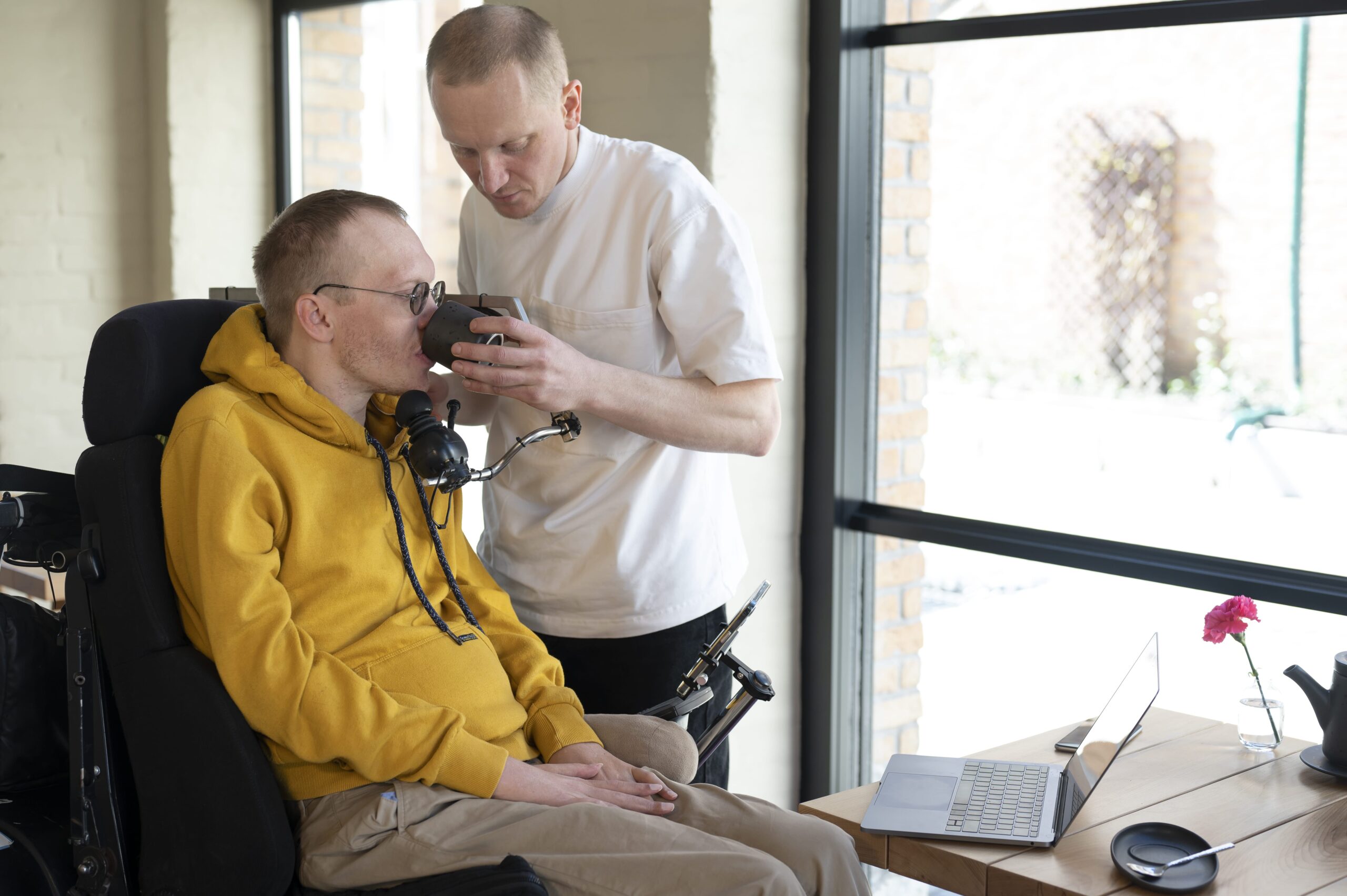Are you wondering what an NDIS support coordinator can do for you if they are one of your funded supports? Support coordinators help you coordinate all aspects of your plan’s services. They will help you source the appropriate NDIS support for your needs to maximize your funding. Not only that, they can help you navigate your funded activities by holding your hand.
NDIS support coordination plays a key role in helping Australians with disabilities live more independently, be an active part of the community, and form meaningful relationships with those around them. Working in support coordination is a rewarding profession as coordinators get the satisfaction of knowing they are improving people’s quality of life with each shift.
Let’s look at this type of coordination of NDIS in more detail.
What is Support Coordination?
Support coordination assists NDIS Participants in implementing the supports stated in their NDIS plan, which may include informal, mainstream, community, and funded supports.
Support Coordination may be one of the Capacity Building categories of support specifically included in your NDIS plan to assist with choice and control. Support Coordination is classified into three types:
- Support connection (level 1)
- Support Coordination (level 2)
- Specialist support coordination (level 3)
The number of hours of Support Coordination provided per year varies depending on the needs and situation of the Participant. Some people may receive 50 to 100 hours of support coordination (up to two hours per week), while others may receive more. The NDIA spends about 3 to 4% of its total NDIS budget on support coordination.
Unlock Your NDIS Potential: Harness Support Coordination
Discover the invaluable role of NDIS support coordinators and how they can help you maximize your funding, access appropriate supports, and navigate your NDIS journey with confidence.
Types of NDIS Support Coordination
If you’re unfamiliar with NDIS support coordination, there are three levels that can be included in your plan:
Support connection: A type of short-term support coordination designed to connect you with the service providers. This is a lower level of support coordination that may be provided to some participants with lower-level care needs.
Support Coordination: This level of assistance is also known as coordination of support that helps you develop the skills needed to understand, implement, and use your plan. An NDIS Support Coordinator’s role is to help you understand the NDIS and your own plan so that you can make informed decisions about your support. They will also connect you with service providers and help you navigate any issues that arise as a result of those relationships.
Specialist support coordination: This is a more advanced and level 3 support coordination. It is intended for people in more difficult situations who require specialised assistance. This NDIS specialist Support Coordinator will assist you in managing challenges in your support environment and ensuring consistent service delivery.
What Is the Role of Support Coordinator?
The daily tasks or responsibilities of a support coordinator are determined by the participant’s needs, goals, and circumstances, as well as the level of support coordination required. A support coordinator can do the following:
1. Assist You in Understanding Your NDIS Plan
If you have any questions about your NDIS plan, then you can contact your support coordinator. They can assist you in understanding your support budget, what you can do with your funding, how your funding is managed, and what other requirements you may have to meet in order to access your support. They can, for example, recommend high-quality and trustworthy therapists, book appointments, and devise strategies to help you manage your own schedule independently.
2. Plan and Coordinate Your Support
Your assistance is personalised, and your support coordinator can assist you in locating the providers, services, and supports that are most likely to benefit you. This includes community, government, and funded supports that can assist you in achieving your goals.
Your support coordinator can assist you in determining how you want your supports and services delivered, experimenting with different providers and new supports to find what best meets your needs, and arranging your services to fit your plan and budget.
3. Provide Support and Services
Your support coordinator should be familiar with the services available in your community. With this knowledge, they can help you find services, choose appropriate NDIS-funded, community, and mainstream supports, and advocate for you if necessary.
4. Establish and Continue to Offer Your Support
They can also help you set up service agreements and service bookings, as well as understand and negotiate the services and support you require. Your support coordinator can also identify any issues that are preventing you from using your plan and work to resolve them.
If you encounter any issues that prevent you from using your plan, your support coordinator can assist you. They can assess how well your supports are working for you, assist you in making contingency plans, and assist you in changing providers if necessary.
5. Provide coaching
Refining and reflecting on your plan can be required, and your support coordinator can assist you by coaching you through the process. As a result, they can help you gain confidence and the skills necessary to carry out your plan on your own, allowing you to get the most out of it.
Your support coordinator can help you if there are any difficulties that prevent you from using your plan. They can help you determine how well your supports are working for you, help you create backup plans, and, if necessary, help you switch providers.
Empower Your NDIS Experience: Embrace Support Coordination
Take control of your NDIS plan by understanding the vital role of support coordinators. Learn how they can empower you to live more independently, engage with your community, and build meaningful relationships.
6. Submit A Report to the NDIA
The National Disability Insurance Agency, or NDIA, is a statutory agency that operates independently. Your support coordinator will report to this agency on how they assisted you in using your plan to achieve your goals. They will report when a new plan is being implemented, in the middle of a plan, and provide plan review reports with recommendations for future plans.
7. Develop Your Independence
Independence is a common goal, and your support coordinator can help you achieve it so that you can select and control your support. They will collaborate with you, your family, and your carers to find providers who can meet your needs, assist you in communicating using your preferred method, and create opportunities for you to do these and other tasks with greater independence.
8. Be Prepared for Unexpected Events and Emergencies
Unexpected events, regardless of the situation, can be upsetting. Your support coordinator can assist you in planning for potential changes that may affect you, such as moving or going to the hospital. They will help you plan for such changes while also building your confidence so that you can do it yourself.
They can also assist you in developing a plan for obtaining the appropriate crisis services when they are required, and they may be able to connect you with crisis services such as the justice, mental health, and child and family protection systems.
9. Do what is best for you
Above all, your support coordinator should have your best interests in mind when recommending support and services.
Coordination of your NDIS plan
As we mentioned earlier that there are three levels of official coordination of support. Regardless of your level, you will always be treated as an individual with individual needs by your support coordinator. Your unique situation will be assessed, and what you need will be determined.
Often, their goal is to help NDIS clients reach the point where they require little or no plan coordination assistance. The provider will likely help you with everything from using the NDIS portal to finding the right support providers, making bookings with them, setting up service agreements with them, and allocating funding appropriately across all.
Using their experience, they will make it as simple as possible to navigate the NDIS and meet your goals.
Your NDIS plan manager will be responsible for watching your budget spending. Find a good NDIS plan manager if you have the funding for one by reading our article. There is a detailed explanation of how they can help and tips on finding the right one.
How to Find a Support Coordinator
If you want to include support coordination funding in your plan, you must request it at your planning meeting or during a plan review. You can find the registered support coordination providers online as well. A Local Area Coordinator (LAC) or an Early Childhood Early Intervention (ECEI) partner can also help you to find a support coordinator.
It is essential to ask questions about the services that will be provided to find a good support coordinator. Remember, a support coordinator is supposed to help you achieve your goals, so make sure they have the ability to do so.
You can ask the questions listed below. It can help you determine whether the support coordinator you’re considering is the best fit for you.
Some questions to consider include the following:
- How long have they worked as support coordinators?
- What is the price of their services, and what is included?
- Can they give you examples of how they have assisted other participants in making the most of their assistance?
- Will there be a notice period required if you decide to change support coordinators in the future?
- Do they understand your objectives and what you want to accomplish?
Transforming Lives: The Impact of NDIS Support Coordinators
Explore the rewarding work of NDIS support coordinators and how they positively impact the lives of individuals with disabilities, promoting independence, community engagement, and the pursuit of meaningful relationships.
What are the services an NDIS Support Coordinator cannot provide?
Support coordinators, like LACs, are extremely busy. And there are some things that Support Coordinators do not do. Support Coordinators are not allowed to:
- make decisions about the plan’s adequacy!
- request unscheduled plan reviews from NDIA.
- provide participants with transportation
- carry out plan administration or plan management
- plan the support rostering
- engage in advocacy
- provide disability assistance (except under special circumstances).
The NDIS legislation includes rules that govern how Support Coordination is supposed to work.
Wrapping Up!
Support Coordination is an NDIS-funded service that helps participants make the most of their NDIS funds. A Support Coordinator is an important person who can help bring your NDIS plan to life.
They collaborate with you and other service providers to balance your funding arrangements, support needs, and goals. At Wise Choice, we work with you to ensure that you are supported in all aspects of your NDIS Plan, and we empower clients to make choices about their well-being, service delivery, and lifestyle.
We can assist you in developing and managing your plan, as well as tailoring and coordinating the services you require, including collaborating with other service providers.



